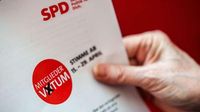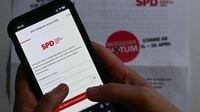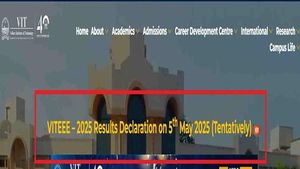As the political landscape in Germany shifts, the potential formation of a black-red coalition between the CDU/CSU and the SPD hangs in the balance, pending the results from a crucial member vote. With the SPD membership tasked with approving the coalition agreement, uncertainty looms over the future of this government alliance.
On April 30, 2025, the SPD members completed their voting process regarding the coalition agreement with the CDU and CSU, which lasted for 15 days. Approximately 358,000 members were eligible to cast their votes, with the digital polling station closing at 23:59 on the final day. The results of this vote are expected to be announced around 10:30 AM on the same day.
While CDU and CSU leaders have already introduced their designated ministers, the SPD's internal dynamics are proving more complicated. Reports indicate that at least eight members of the Berlin SPD parliamentary group are poised to vote against the coalition agreement. This dissent is spearheaded by Orkan Özdemir, a prominent SPD member, who has taken to social media to rally opposition to the agreement. In a video posted on Instagram, Özdemir criticized the argument that only a coalition with the CDU could prevent the rise of the far-right AfD, calling it a "toxic emotional manipulation."
He argues that those advocating for collaboration with the AfD are the real threat to democracy, stating, "The responsibility for the rise of the right-wing party lies with those who want to work with them." This internal strife within the SPD raises questions about the coalition's viability and the potential consequences of a rejection.
Should the SPD members vote against the coalition agreement, it could lead to new elections, a scenario that might benefit the AfD, which has seen a rise in support in recent polls. However, Juso leader Philipp Türmer remains optimistic, suggesting that a rejection could open the door for renewed negotiations between the Union and the SPD. He stated, "No one is stopping the Union and the Social Democrats from reaching a new agreement."
As the SPD grapples with its decision, the CDU and CSU have already begun presenting their ministerial appointments. Notable figures include Dorothee Bär (CSU) as Federal Minister for Research, Technology, and Aerospace, and Alexander Dobrindt (CSU) as Federal Minister of the Interior. However, this list has not been without controversy; the Christian Democratic Employees' Association (CDA) has criticized the absence of its members from the ministerial lineup, highlighting a disconnect between the party's leadership and its grassroots.
Amidst this backdrop, the SPD's vote is not merely a formality but a critical juncture for the party. Alexander Schweitzer, the SPD leader in Rhineland-Palatinate, expressed confidence in a favorable outcome, asserting, "We have negotiated a solid coalition agreement that embodies social democracy. Our members understand that the people of Germany expect a capable government to implement this agreement during these challenging times."
The coalition agreement includes key promises such as a minimum wage of 15 euros and tax cuts for low- and middle-income earners. However, it also faces scrutiny for proposed tightening of migration and social policies, which has drawn opposition from the Juso leadership, calling for renegotiations.
Despite the internal disagreements, the likelihood of majority approval remains high. The SPD has previously conducted member votes on coalition agreements in 2013 and 2018, both of which saw substantial support. In 2018, 78.4% of members participated, with 66% voting in favor, while 76% approval was recorded in 2013.
As the SPD prepares for the announcement of the vote results, the political stakes are considerable. If the coalition agreement is approved, it will be signed on May 5, 2025, paving the way for the election of CDU leader Friedrich Merz as Chancellor the following day. The SPD is expected to reveal its seven ministers for the new government after the vote.
In Hessen, the SPD's decision-making process has been particularly fraught. Discussions among members have revealed a mix of skepticism and responsibility. Local leaders, such as Hanno Benz, the mayor of Darmstadt, have indicated a sense of duty to form a stable government, recognizing the political landscape's urgency. Benz stated, "There is no other option than a coalition between the SPD and CDU," emphasizing the need for pragmatism over ideological purity.
While the proposed coalition agreement has garnered some support for its socio-economic measures, it has also faced pushback over contentious issues like migration policy. Some members express frustration over the absence of progressive tax reforms and climate action within the agreement.
As the SPD navigates these complex internal dynamics, the outcome of this vote will not only determine the party's immediate future but will also shape Germany's political landscape for years to come. The coalition's success hinges on the ability of its leaders to unite the party and present a coherent vision that resonates with both their members and the electorate.
With the clock ticking and the stakes high, the SPD's decision on the coalition agreement will soon be revealed, setting the stage for the next chapter in German politics.





